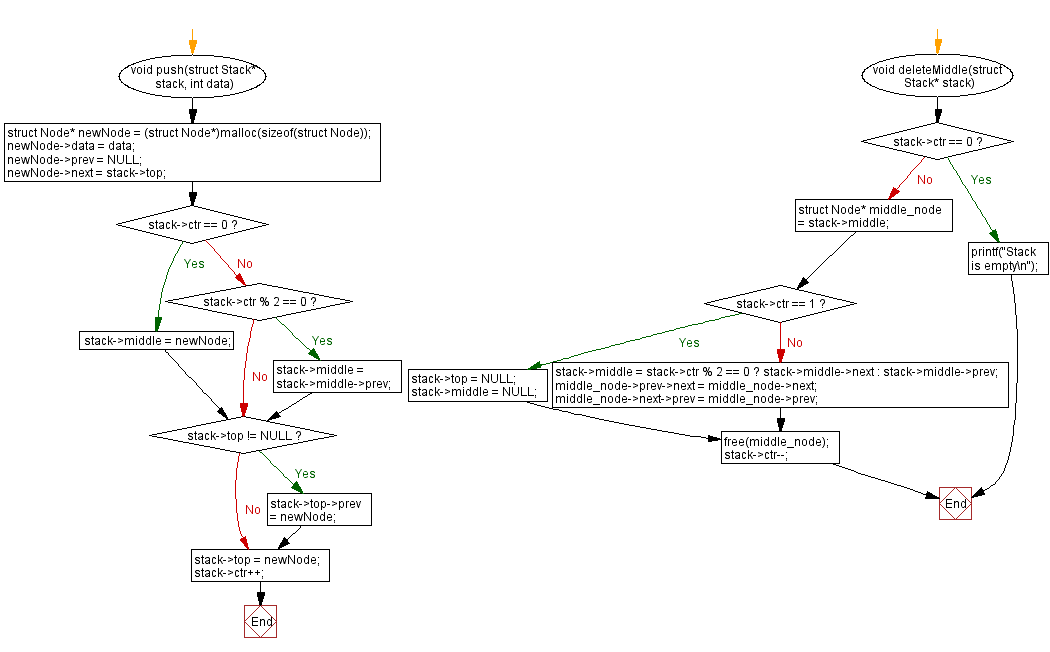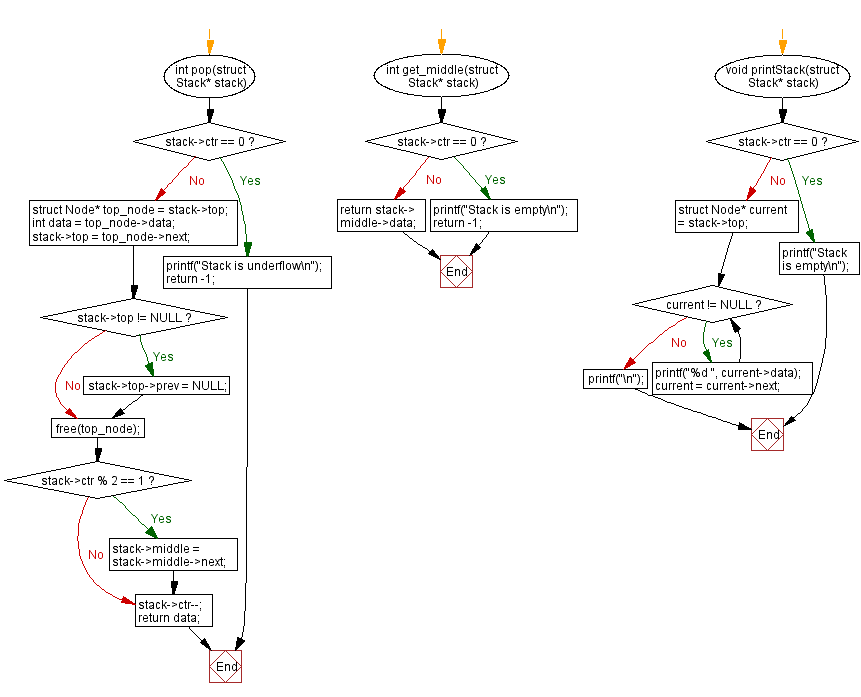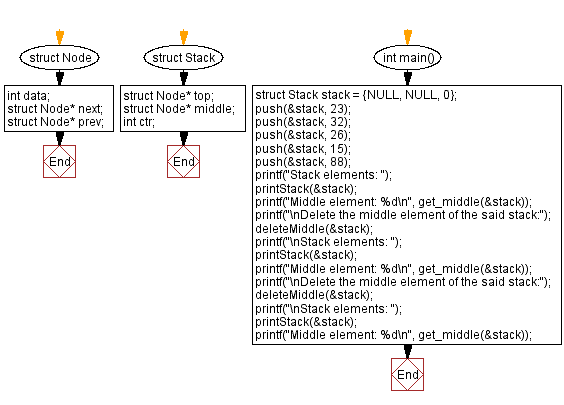C Exercises: Stack push, pop, get middle, and delete middle elements
13. Middle Element Operations in Stack
Write a C program to implement a stack that supports push, pop, get middle, and delete middle elements.
Sample Solution:
C Code:
#include <stdio.h>
#include <stdlib.h>
// Node structure to represent elements in the stack
struct Node {
int data;
struct Node* next;
struct Node* prev;
};
// Stack structure with top, middle pointers, and a counter to track elements
struct Stack {
struct Node* top;
struct Node* middle;
int ctr;
};
// Function to push an element onto the stack
void push(struct Stack* stack, int data) {
// Create a new node
struct Node* newNode = (struct Node*)malloc(sizeof(struct Node));
newNode->data = data;
newNode->prev = NULL;
newNode->next = stack->top;
// Update the middle pointer based on the number of elements
if (stack->ctr == 0) {
stack->middle = newNode;
} else if (stack->ctr % 2 == 0) {
stack->middle = stack->middle->prev;
}
// Update the previous pointer of the top node
if (stack->top != NULL) {
stack->top->prev = newNode;
}
// Update the top pointer and increment the counter
stack->top = newNode;
stack->ctr++;
}
// Function to pop an element from the stack
int pop(struct Stack* stack) {
if (stack->ctr == 0) {
printf("Stack is underflow\n");
return -1;
}
// Pop the top node
struct Node* top_node = stack->top;
int data = top_node->data;
stack->top = top_node->next;
if (stack->top != NULL) {
stack->top->prev = NULL;
}
free(top_node);
// Update the middle pointer based on the number of elements
if (stack->ctr % 2 == 1) {
stack->middle = stack->middle->next;
}
stack->ctr--;
return data;
}
// Function to get the middle element of the stack
int get_middle(struct Stack* stack) {
if (stack->ctr == 0) {
printf("Stack is empty\n");
return -1;
}
return stack->middle->data;
}
// Function to delete the middle element of the stack
void deleteMiddle(struct Stack* stack) {
if (stack->ctr == 0) {
printf("Stack is empty\n");
return;
}
// Get the middle node
struct Node* middle_node = stack->middle;
// Update the pointers based on the number of elements
if (stack->ctr == 1) {
stack->top = NULL;
stack->middle = NULL;
} else {
stack->middle = stack->ctr % 2 == 0 ? stack->middle->next : stack->middle->prev;
middle_node->prev->next = middle_node->next;
middle_node->next->prev = middle_node->prev;
}
free(middle_node);
stack->ctr--;
}
// Function to print the elements of the stack
void printStack(struct Stack* stack) {
if (stack->ctr == 0) {
printf("Stack is empty\n");
return;
}
struct Node* current = stack->top;
while (current != NULL) {
printf("%d ", current->data);
current = current->next;
}
printf("\n");
}
// Main function
int main() {
struct Stack stack = {NULL, NULL, 0}; // Initialize the stack
// Push elements onto the stack
push(&stack, 23);
push(&stack, 32);
push(&stack, 26);
push(&stack, 15);
push(&stack, 88);
// Display the stack elements
printf("Stack elements: ");
printStack(&stack);
// Display the middle element
printf("Middle element: %d\n", get_middle(&stack));
// Delete the middle element
printf("\nDelete the middle element of the stack:\n");
deleteMiddle(&stack);
// Display the updated stack and middle element
printf("\nStack elements: ");
printStack(&stack);
printf("Middle element: %d\n", get_middle(&stack));
// Delete another middle element
printf("\nDelete the middle element of the stack:\n");
deleteMiddle(&stack);
// Display the updated stack and middle element
printf("\nStack elements: ");
printStack(&stack);
printf("Middle element: %d\n", get_middle(&stack));
return 0;
}
Output:
Stack elements: 88 15 26 32 23 Middle element: 26 Delete the middle element of the said stack: Stack elements: 88 15 32 23 Middle element: 15 Delete the middle element of the said stack: Stack elements: 88 32 23 Middle element: 32
Flowchart:



For more Practice: Solve these Related Problems:
- Write a C program to implement a stack that retrieves the median element in constant time.
- Write a C program to design a stack where deletion of the middle element occurs in O(1) time.
- Write a C program to insert an element directly into the middle of a stack and adjust pointers accordingly.
- Write a C program to automatically rebalance a stack after removing its middle element.
Go to:
PREV : Maximum Element in Stack Variants.
NEXT : Average and Statistical Measures of Stack.
C Programming Code Editor:
Have another way to solve this solution? Contribute your code (and comments) through Disqus.
What is the difficulty level of this exercise?
Test your Programming skills with w3resource's quiz.
